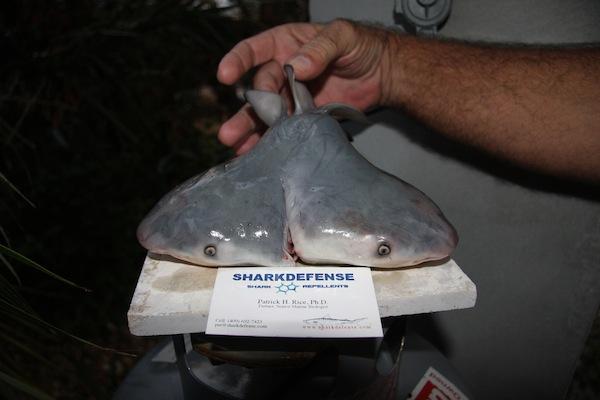Source: Indian Country Today Media Network

This two-headed bull shark fetus was in the womb of a female captured off Florida in April 2011.
We’ve heard of conjoined twins in human babies. Now it has been recorded, apparently for the first time, in a bull shark.
A fisherman trolling off the coast of Florida in April 2011 caught its mother and found multiple fetuses inside, one appearing to have two heads, said a study published in the Journal of Fish Biology on March 25. The clinical name for this is dicephalia, Michigan State said in a media release, also known as axial bifurcation. It happens when the embryo starts splitting in two, as with identical twins, but does not complete the process.
“Each head has five pairs of gills and gill openings, a single pair of eyes, a single pair of nares and a mouth with well-developed dentition,” wrote study so-author Michael Wagner, an assistant professor of fisheries and wildlife at Michigan State University, according to the New York Daily News. “The teeth appear both normally formed and the observed dental formula is within the normal range.”
Such sights are rare, partly because animals born with such profound deformities usually die soon after birth, Michigan State said. Since this one was found in the female shark’s womb, it was still alive. However, it did not survive long after the fisherman cut the umbilical cord; its normally developed siblings swam away when released.
It looks not unlike the two-headed trout that turned up a little too close to the mining operations of the J.R. Simplot Company last year and caused a stir.
“This is certainly one of those interesting and rarely detected phenomena,” said Wagner, who worked with colleagues at Florida Keys Community College. “It’s good that we have this documented as part of the world’s natural history, but we’d certainly have to find many more before we could draw any conclusions about what caused this.”
Likewise, he cautioned, the shark’s existence did not say anything concrete about pollutants.
“Given the timing of the shark’s discovery with the Deepwater Horizon oil spill, I could see how some people may want to jump to conclusions,” Wagner said in the Michigan State release. “Making that leap is unwarranted. We simply have no evidence to support that cause or any other.”
Read more at http://indiancountrytodaymedianetwork.com/2013/03/28/move-over-simplot-trout-first-ever-two-headed-bull-shark-caught-florida-148432
